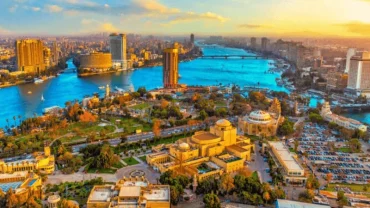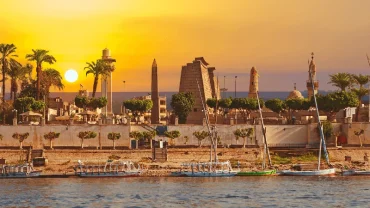Aswan is a captivating treasure, brimming with remarkable sites that echo the epic stories of ancient gods and rulers. This article is designed to provide travelers with a comprehensive guide to the enchanting city of Aswan. Crafted by a team of seasoned tour operators, expert guides, historians, and travel consultants, it offers deep insights into Aswan’s rich culture, history, and charm. While Egypt is home to many incredible cities, Aswan stands out as a true gem.
Aswan Facts
Aswan serves as the gateway to southern Egypt, boasting rare and mesmerizing archaeological sites such as Crocodile Island and Elephantine Island. These islands were crucial trade links between ancient Egypt and various African civilizations, bridging the South and the North. Historically, Aswan was the southern frontier of Egypt and a cultural hub for the Nubian people. The city has been integral to Egypt’s history since its inception, being a key source of valuable building materials like limestone, quartzite, and granite. Aswan is celebrated as one of the world’s most significant and picturesque cities, with its numerous monuments offering a window into pre-historical times. Today, it is a thriving tourist destination with a population of 1,568,000 and is recognized by UNESCO as a member of the Creative Cities Network in the folk art and craft category.
Aswan’s History
Aswan, located at the southernmost edge of Egypt, has played a pivotal role in the country’s history for thousands of years. Known in ancient times as “Swenett,” the city was strategically positioned as a gateway between Egypt and Africa. Its significance grew from its role as a military stronghold, a trade hub, and a cultural center. Aswan’s rich quarries provided the stones used to build many of Egypt’s most famous monuments, including obelisks and pyramids. Over the centuries, Aswan evolved into a melting pot of cultures, where Egyptian and Nubian traditions blended. Today, it remains a living museum of ancient civilization, with temples, monuments, and a vibrant community that reflects its storied past.
Origins and Significance of Aswan
Aswan’s origins trace back over 4,500 years, when it was known as “Swenett,” later evolving into “Swan” or “Sonu,” meaning market. The city was strategically located on the main trade route between Egypt and the lands to the south, serving as a crucial supplier of gold, ivory, and other valuable resources. Aswan also had deep religious roots, being home to the worship of Khnum, the god of the Nile’s source, and later Isis, the goddess of protection and magic. The city’s quarries provided the materials for monumental constructions like obelisks and pyramids. Aswan was not only a commercial hub but also a military center, playing a significant role in Egypt’s defense, especially during the Hyksos wars. During the Roman period, several temples were built to honor Egyptian deities, including the Philae Temple, dedicated to Isis, symbolizing love and motherhood.
Aswan Location
Aswan is located in Upper Egypt, approximately 220 km (137 mi) south of Luxor and 890 km (553 mi) south of Cairo, at the southern end of the Nile Valley. This historically significant city lies on the eastern bank of the Nile, directly facing Elephantine Island, where the ruins of the ancient city of Yeb stand. Aswan is the largest city in Upper Egypt and the third-largest in the country.
The city’s climate is characterized by its hot temperatures year-round, making it one of the warmest regions in Egypt. The Nile River widens to nearly 650 meters (0.40 mi) as it flows past Aswan, continuing its journey northward for over 1,200 km (750 mi) without encountering a single cataract.
Aswan’s geographical landscape was dramatically altered in the 1960s due to the construction of the Aswan High Dam, which resulted in the near flooding and destruction of several significant temples, including Abu Simbel and Philae. However, thanks to a remarkable rescue mission led by UNESCO, these majestic monuments were successfully relocated to safer ground, preserving their historical legacy. Today, Aswan continues to captivate visitors with its unique blend of natural beauty, ancient history, and cultural significance.
Climate of Aswan
Aswan is known for having one of the driest, hottest, and sunniest climates in the world. The city experiences high humidity, with summer temperatures from May to September reaching up to 40°C (104°F). During the winter months, from October to March, temperatures are milder, averaging around 23°C (73.4°F). The intense heat and clear skies make Aswan a unique destination for those seeking warm weather year-round.
Aswan Tourist Attractions
Aswan is home to some of Egypt’s most captivating and historically significant tourist attractions, offering a deep insight into the ancient civilization’s mythology, artistry, and grandeur. Among the most iconic sites is the Abu Simbel Temple, built by Ramses II in 1244 BC to honor his legacy and celebrate his victories, such as the Battle of Kadesh in 1224 BC. This magnificent temple is dedicated to the gods Amon, Ptah, and Re-Hor-Akhty, and is famously known for the Sun Festival, held on February 22 and October 22 each year, when sunlight illuminates the inner sanctuary.
Another prominent landmark is the Philae Temple, constructed in 690 BC as a center of worship for the goddess Isis. The site’s religious significance and stunning architecture make it a must-visit destination. The Unfinished Obelisk of Hatshepsut, an immense monument carved from solid rock, offers a glimpse into the incredible engineering feats of ancient Egypt.
Aswan also boasts the Temple of Kom Ombo, built between 332 and 395 BC to honor Sobek, the god of the Nile. The Temple of Edfu, dedicated to the sky god Horus, stands as a testament to the legendary battle between Horus and his uncle Set.
Beyond these well-known sites, Aswan offers numerous hidden gems, including the Monastery of St. Simeon, the Tombs of the Nobles, the Aga Khan Mausoleum, the Fatimid Cemetery, the Kiosk of Qertassi, and the Temple of Khnum. Aswan’s rich history extends into the Roman, Turkish, and British eras, serving as a strategic frontier garrison. The city also played a pivotal role in the spread of Christianity in the fifth century, with many ancient temples being converted into churches. Later, during the sixth and seventh centuries, Aswan became an important center of Islamic learning, adding another layer to its diverse and storied past.
Best Aswan Day Tours
These incredible historical sites are highlights of Aswan day tours, offering you the perfect opportunity to discover the treasures of this Nubian city. From awe-inspiring temples and tombs to fascinating ancient artifacts, Aswan tours allow you to experience it all. Explore our Aswan day tours and find the vacation that fulfills your dreams.






Comment (0)